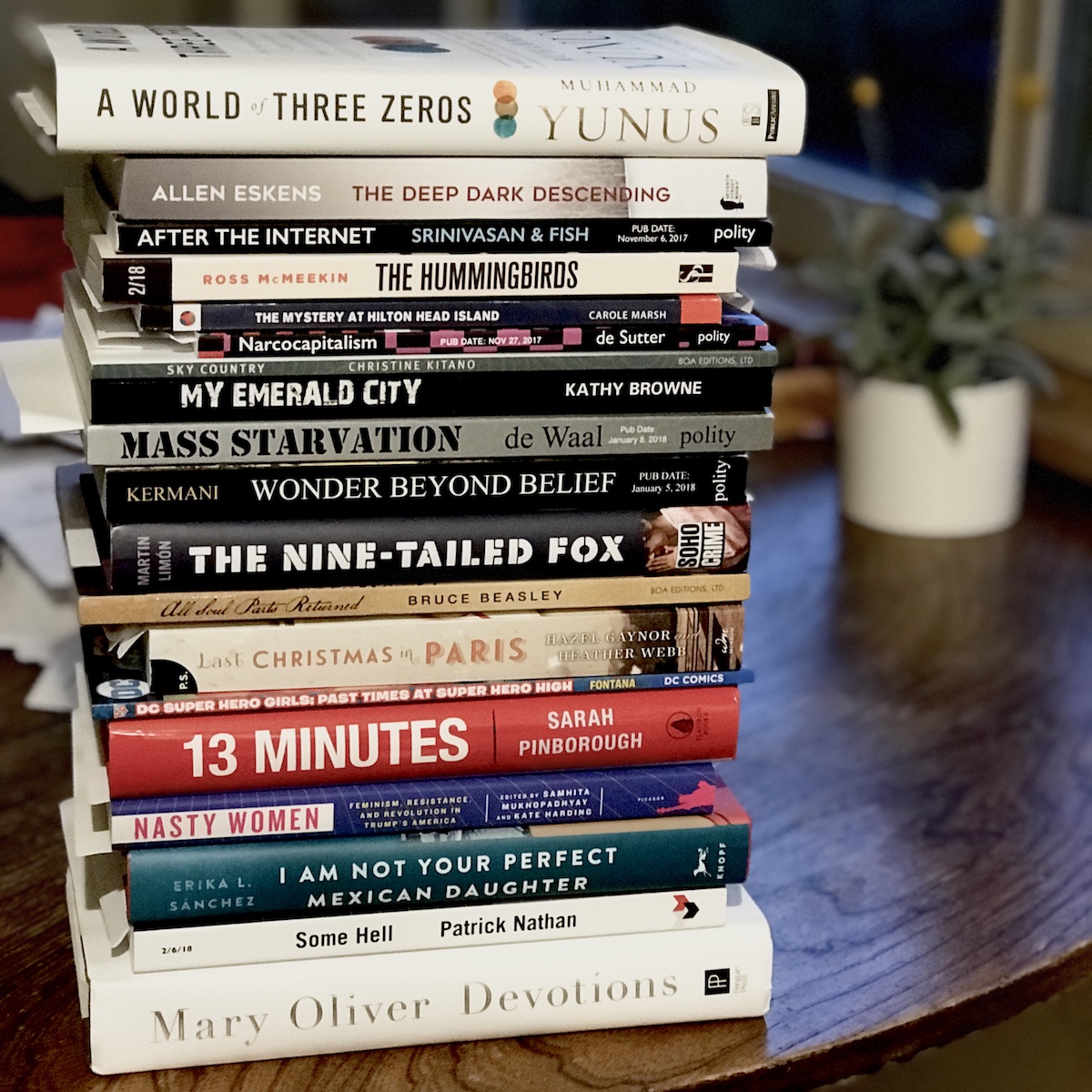Franklin Foer has advice for any city looking to become Amazon's second headquarters
Franklin Foer’s World Without Mind is a must-read book of the fall season. Subtitled The Existential Threat of Big Tech, World is a full-frontal assault on the fallacious idea that the big four tech companies that shape our world — Google, Amazon, Facebook, and Apple — are benevolent firms that have the advancement of humanity in mind.
Foer smartly couches his polemic in memoir, relaying his experiences as a beloved editor of the New Republic. When the storied magazine was bought by a tech gadfly, its century-old dedication to the art of journalism and thoughtful opinion was discarded in favor of click-hungry content farming. Foer was fired, and the majority of his staff left with him in solidarity.
A lesser writer could seem like an aggrieved party in World, and Foer certainly does acknowledge that his pride was wounded in the aftermath of the New Republic’s Silicon Valley-styled meltdown. But instead he makes a compelling case for considered, intellectual thought in the public sphere, even as he rages against the slick digital robber barons who have consumed our attention in exchange for a few baubles of convenience.
Foer reads from World at Elliott Bay Book Company on Wednesday, September 27th at 7 pm. The event is free; no purchase is necessary. I hope you'll go hear him out. You’ll likely think a little differently about the urgings of the vibrating hunk of glass and steel in your pocket after the event.
What follows is a lightly edited transcript of a phone conversation I had with Foer last week.
I assume you heard the news that Amazon recently announced that they're looking to found a second separate-but-equal headquarters in another city?
Yes.
Now we're watching cities bow and scrape in the hopes of bringing Amazon to them. Tucson just sent a giant cactus to Amazon management, like some sort of a weird dowry or something. I was wondering if you had any advice for cities that might be trying to entice Amazon to set up in their city?
Let's just look at Amazon's track record when it comes to exploiting civil government. Part of its business model has been to fleece local municipalities — with its refusal to pay sales tax over time, or all the concessions that it extracts when it goes about setting a warehouse down.
I think the right metaphor is the sports stadiums that get built in cities, where owners come in and exploit civic pride and sense of civic purpose in order to get these fantastical deals for themselves, where cities empty their coffers in order to build these monumental facilities that teams then make money off of.
I just think it's sad. And part of the sadness is that we can see where this is going over the long run, which is that Amazon may bring jobs in the short term, but they really don't want those jobs over the long run. In the long run, when Amazon puts down a warehouse, it's going to automate it, so there are not going to be workers.
I wonder whether these cities are doing anything to remotely try to calculate the long-term economic benefit for themselves. I doubt it.
One of the things that I thought was especially interesting in this book was the writing about media, especially the parts that focused on your own experience. I left a publication soon after management installed [analytics software] Chartbeat because they devalued arts coverage after they learned that it wasn't as popular as they had assumed it was.
I've done a lot of thinking since then that maybe the original sin for the marriage between media and the internet was the decision by Google founders that a click on an ad was only worth a fraction of a cent. It's a system that doesn't allow for the fact that some clicks could be worth more to some advertisers than to others. It's very rigid. Do you think there's a way to change that discussion — to revalue the importance of writing as valued by advertising — or is the advertising model basically dead for media?
My sense is that the advertising model is kind of dead in the short term. I fundamentally agree with you that Google has deflated the advertising market as it exists now beyond any reasonable significance to media companies. We need to move on to something different.
My preference is to move to a subscription model, but I also think that it's possible that there's some form of advertising that hasn't been invented yet that could be more valuable than display advertising, and less corrupting than the native advertising that we've seen people moving towards over time. But I'm not smart enough to know what that is.
Do you think anyone's getting close to it? Do you see anybody doing things that you like?
What I like is the resurgence of subscription models. I like that the New York Times and the Washington Post seem to be selling subscriptions in some volume, re-acclimating people to the idea of having to pay for what they read.
But I also think that the subscription model as it exists now for digital journalism isn’t valuable on its own because the prices are set far too low. We're kind of in this place where everything has been deflated. The value of digital advertising has been deflated, the value of digital subscriptions has been deflated, and it's hard to see where exactly the fast-forward is.
One thing that I do think -
Sorry that I don't have the cheerful, optimistic solution for you.
It's okay. Nobody has those solutions, that's the thing. That's why it's important to keep thinking about it. But one thing that I do think the internet has done really well — and I don't know if it gets a lot of credit from people in the media on this — is to provide a platform for people who have never before had voices in the media.
Yes.
I find it really difficult to argue for a return to the old gatekeeper model when there's now more representation in culture than ever before. Is there a way to reclaim institutional thought and consideration while still maintaining the representational progress we've seen in the last 10 years?
Yeah. That doesn't seem terribly difficult to me. I think that institutional journalism has responded to the internet, and also a shift in times, by being much more representative. I think that when it comes to a lot of these questions about new technology and old media, it's easy to slip into Manichean thought. The choice isn't between going back to the old media of the 1980s — which was stodgy, excessively white male, etc. — versus the status quo. I think we have the ability to do better on all fronts. I don't think that we need to abandon all the good aspects of change in order to respond to the bad aspects of change.
As you were collecting ideas for this book, where did you draw the line between reality and conspiracy theory, and between apathy and malevolence in the intent of these companies? It's very easy for me to get too wrapped up in this sort of good guy/bad guy paradigm, when the truth of their intent is much more complex. Is this something you've had to think about as you’ve put this book together? This is kind of a vague question and I'm very sorry — can you retrieve anything of value out of that?
I think you're saying that it's possible to look at what the tech companies do and come to the conclusion that they're highly malevolent, when in fact they may have a lot of ideas that could be caricatured as malevolent, but in fact are relatively benign. Is that what you're saying?
Yeah. That's a good, solid place to start for sure.
I would say that what makes these companies interesting is that they're idealistic and ambitious. I think one does need to take seriously their own self-description. I think that we need to treat them as not just money-making corporations, but treat them also as companies that have ambitions to change the world. Sometimes they're self-justifying ambitions. I think that [Facebook founder Mark] Zuckerberg does a lot of self-justifying, but in other instances I think that they're perfectly sincere in describing how they want to change the world.
[Calling it] a conspiracy makes it sound like people are sitting in a back room somewhere in Palo Alto devising a hidden plan. My point is that the plan isn't actually very hidden. I think that a lot of times these companies, for the most part, are very naked in describing what they're up to, so I don't really think it takes a whole lot of reading to go to the place I go when I'm describing them.
Do you worry when you put this book out that there's a chance that you might be pigeonholed in the role of the curmudgeon — like, CNN will call you to fill out a panel whenever they need someone to just complain about Big Tech?
Yeah, I've clearly cast myself as grandpa. I don't understand why that's a worry. Am I worried that I'm a token, is that what you’re asking?
The media tends to find value in people who say “no,” but they value them only if they say “no” in the same way again and again. I wonder if there's a possibility of you being typecast as the man who said “no.”
I feel like I'm just writing my opinion. Really I wasn't thinking about being on a CNN panel when I was writing about this book. I want my argument to be heard, so I'd probably go on a CNN panel, but really I live to write books and arguments, not to be on CNN panels, so that's what I think about most.
Do I worry about getting typecast as a curmudgeon? If that's your question, I clearly don't really worry about that because I wrote a book that can easily be described as curmudgeonly.
What has the response been like at your events? Is there anything that you think that people can expect coming out to your reading in Seattle?
One of the interesting things in the moment that we've arrived at is there's this concept that's become cliché in describing our politics, which is this concept of the Overton Window, which is when the discourse expands to include ideas that resided outside of the mainstream.
When I started working on this book, I felt like people looked at me weirdly, and they couldn't understand why I was going to be criticizing these companies in technology that people have so much affection for.
Over the last couple months, I happened to make an argument that lined up with a shift in thinking. In large part, I think the election started to change people's minds about Facebook, and then Amazon's purchase of Whole Foods elicited a lot of anxiety about Amazon's size, and etc.
One of the fascinating things is that there are a lot of people who I thought would hate my argument. I've just been surprised at the people who are either centrist or in finance — or even in Silicon Valley — who seem sympathetic to my argument. It feels like I thought I was going to be throwing a stone at the Overton Window, but instead, it feels like I'm just climbing through the Overton Window just as it's opening.
The Sunday Post for September 24, 2017
Each week, the Sunday Post highlights a few articles good for slow consumption over a cup of coffee (or tea, if that's your pleasure). Settle in for a while; we saved you a seat. You can also look through the archives.
The College Try
Ashley Powers follows two young women attending Cal State Long Beach and gives us a new perspective on “working your way through college,” one that’s a bit less rosy than the classic American trope. Liz Waite carries a full course load while bouncing from couch to couch and navigating a labyrithine system of social aid; Kersheral Jessup makes it to graduation, but it’s not enough to get her out from behind the cash register at Home Depot. An effective and sobering debunking of the bootstrap myth.
No type of school has been more successful at lifting the poor up to the middle class and beyond than midtier public universities like the Cal States. In a ranking published this year of colleges that helped the highest percentage of students claw their way out of poverty, four Cal State campuses made the top 10. Cal State Long Beach clinched the last spot, vaulting 78 percent of its students from the bottom of the economic ladder, where household incomes top out around $25,000 a year. But for all the good Cal State does for its alumni, most students there struggle to get their degrees. Only one in five finishes in four years, and a little more than half graduate in six, their progress slowed, in part, by soaring living costs in one of the nation’s most expensive states.
Snopes and the Search for Facts in a Post-Fact World
Speaking of debunking: Snopes.com is famous as the go-to for fending off panicked emails from overly trusting relatives and winning arguments over a second beer. Michelle Dean introduces us to the site’s founders, a scrappy couple who love to get fussy about details, and looks at how Snopes is changing in a country led by the most terrifying urban myth of all.
Since about 2010, this house has passed for a headquarters, as Snopes has no formal offices, just 16 people sitting at their laptops in different rooms across the country, trying to swim against the tide of spin, memes, and outright lies in the American public sphere. Just that morning Mikkelson and his staff had been digging into a new presidential tweet of dubious facticity: “122 vicious prisoners, released by the Obama Administration from Gitmo, have returned to the battlefield. Just another terrible decision!” Trump had the correct total, but the overwhelming number of those detainees had been released during the George W. Bush administration. “There’s a whole lot of missing context to just that 122 number,” Mikkelson said.
My Abyss
Hazlitt has two very good recent pieces about living in your head, both love stories of a kind. I can’t choose between them, so you get both: Soraya Palmer on her decades-long affair with an imaginary boyfriend, who will never love her the way she wants to be loved, and Patty Yumi Cottrell on her obsession with Fiona Apple, which is actually a devastating story about her brother.
Among my collection of photos, there’s one of Fiona Apple from 1998 that I purchased at a CD Warehouse in a Milwaukee plaza. I’ve kept this photo of Fiona Apple with me all these years, moving from Milwaukee to Minneapolis to Milwaukee to Chicago to New York City to Los Angeles. Every time I pack up my things, I consider throwing it away. It makes me think of abject despair and isolation and my teenage bedroom. It makes me think of my life with my brother, watching NBA games in his dark cocoon of a room, avoiding the rest of our family. He preferred Tori Amos to Fiona Apple. We would argue about who was better at Christmas. He loved Tori Amos, which I thought was weird for a man. He was sensitive. No. I will never throw away my Fiona Apple photo.
Loyalty Nearly Killed My Beehive
Under John Knight’s care, a beehive survives a near-Shakespearean drama, a tragic battle for rule and survival of the hive, complete with love, loss, and self-destruction. (Or is it Game of Thrones?) From a bee’s perspective, the beekeeper is the ultimate deus ex machina. But even the god in the machine has to play by genre rules.
My unraveling colony made clear to me the complex, fraught relationship between honeybee and beekeeper. Bees are tremendously self-sufficient, and follow a set of old and finely tuned instincts. The beekeeper, ideally, needs only to nudge them in the right direction to make them do what he wants: pollinate an almond orchard, or survive on a Brooklyn rooftop. But to do this correctly, the beekeeper needs to understand what it is the hive wants. In my case, Todd was telling me, it wanted to die.
'To Donald Trump,' by Leland Melvin
Leland Melvin, former NASA astronaut and NFL player, famous dog-lover, suggests we send Donald Trump to space. Is that an option?
Looking back at our planet from space really helps one get a bigger perspective on how petty and divisive we can be. Donald Trump, maybe you should ask your good friend Mr. Putin to give you a ride on a Soyuz rocket to our International Space Station and see what it’s like to work together with people we used to fight against, where your life depends on it. See the world and get a greater sense of what it means to be part of the human race, we call it the Orbital Perspective.
Seattle Writing Prompts: Safeco Plaza
Seattle Writing Prompts are intended to spark ideas for your writing, based on locations and stories of Seattle. Write something inspired by a prompt? Send it to us! We're looking to publish writing sparked by prompts.
Also, how are we doing? Are writing prompts useful to you? Could we be doing better? Reach out if you have ideas or feedback. We'd love to hear.

When they first constructed this 50 story black obelisk in downtown Seattle, it was the tallest thing around. It dwarfed Smith Tower, and edged out the Space Needle by just enough that it was nicknamed "the box the Space Needle came in." Wikipedia will tell you that it was the first modern Class-A office building in Seattle, but that doesn't tell you how gorgeous this building is.
Once again, NBBJ comes to the front as the architect of choice for unique buildings. Its large two-story lobby (go in and look around sometime if you never have) surrounding austere white marble clad elevator banks give the inside an airy lightness that works nicely against the dark exterior. The escalators in the back of the building lead down to the lower lobby on 4th avenue, which is a nice mid-century modern spot to sit and eat on a rainy day. The front of the building is dominated by the glassine latticework of the Central Library.
There's a story about that library, possibly apocryphal. After the old building was demolished, Rem Koolhaus, recently commissioned, had come to Seattle to inspect the site, and glean inspiration for the new design. Standing on the mound, he looked down into the lobby of Safeco Plaza, and saw, through the windows, a painting by Sam Francis. It was a massive abstract whose canvas dominated the space, filling up the expanse of wall behind the guard stations. That painting inspired Koolhaus's exterior pattern of the library (which, incidentally, then inspired our logo).
The painting — and also the sculpture out front of the building on 5th Avenue by Henry Moore, titled "Vertabrae" — came from the collection of Seafirst Bank (née Seattle First National Bank), who were the original commissioners of the building we're talking about. Seafirst had an impressive art collection which was passed along to Bank of America when they bought the nearly insolvent Seafirst in 1983.
But Bank of America had no such regional affection for art. When they sold Safeco Plaza in 1986, they also sold the Henry Moore sculpture to Japanese investors. It caused such an outcry locally that Bank of America repurchased the sculpture and donated it to the Seattle Art Museum, who maintain it to this day. But that didn't stop them, in 2010, from relocating the Sam Francis painting to their own art gallery in North Carolina. That austere marble is, perhaps, now a bit too austere, missing its centering artwork.
At the top of the building is a helipad (one of two atop commercial buildings downtown), which is rarely used thanks to rezoning, and then judicious public safety caution after the accident at KOMO in 2014 that killed two and injured one. I've seen a helicopter land there, from the observation deck of Columbia Center, but that doesn't seem to be a very common event anymore. Imagine the day where important bankers were whisked away to make important deals.
Aw hell, we don't have to imagine them. We're writers. Let's create them.
Today's prompts
"The helicopter is approaching, Mr. Brown," said his secretary, Pam. He pulled on his overcoat, loathe to leave the grand view on a day like today, where the Olympic mountains looked close enough to lick, like a snow cone. He rode the elevator up, and then waited on the staircase under the hood for the chopper to land. Ducking against the wind, he ran to the door. He was in and his belt was on when he noticed the pilot was new. He secured his headset. "Where's Frank?" he asked. The pilot, lifting off, didn't look at him. "Now, now, Mr. Brown. Let's now worry about Frank. Frank will be just fine. Let's you and me worry about other things. For example, let's worry about you surviving the next two hours."
It was the bum knee that got her. Couldn't climb worth a damn, and the whole city being hills meant she couldn't get around. No buses went from where she was to where she wanted to be. Couldn't afford a cab, even if she trusted them. Getting from Pioneer Square up to the library was tough. That mean, no books that week. Overdue fines. No checking her email. But then a buddy tipped her: starting on First, go into the Norton Building, and ride their escalator up. One block north to the Wells Fargo Tower, and you can ride those escalators up to third. Walk up to Safeco Plaza, and take those escalators up to Fourth and you'll be dropped off right across the street from the library. But then, entering Safeco Plaza on third, she heard a voice "Hey there mom, let me help you out," and a young man took her arm. She was already winded from the walking she already had to do, so she was slow on the uptake. But looking up, there he was. It couldn't be, but it was him alright. Her own Johnny. And he looked good as the day he died thirty years past.
One little slip of paper. How much it weighed. It pulled at her, like a lead blanket around her shoulders, pulled at her and made her walk slow and heavy. The elevator on the way up to her lawyers office even creaked as she rose, high above the streets of Seattle. Then, later, after some small talk and pastries, and some ceremony of signing, she handed over the check and it was gone. The whole thing was done. Years of struggle, of uncertainty, of pain. The choice was made, the money was drawn, and now she was free. And she knew exactly what the first thing she was going to do was.
On lucky days he rode the elevator with her. She was always holding a library book. Last week it was Pattern Recognition by William Gibson. The week before it was Bad Feminst by Roxane Gay. It would suck, being bothered on the elevator, by a strange dude, so he didn't act on his intense desire to talk to her. Until she started reading kids books. First, The Westing Game, and The Phantom Tollbooth, which made him want to talk to her so bad, and then finally, he had a moment when he saw her holding Bridge to Teribithia. A moment where he got choked up and his eyes watered and he stifled a sob. "Are you okay?" she asked, the elevator stopping to let a man in a gray suit off. He nodded, then, when the doors closed, said "I named my cat Leslie when I was ten." — "Oh," said the woman, not unsympathetically. And the other part he could only say in a whisper. "It was horrible. She drowned."
"That thing? It's huge." — "I know. It's like I told you." — "It's bigger than you said" — "Be that as it may, we still have to get it down" — "We can't crate it. Not that size. Won't even fit in the truck" — "We could take it off the frame, roll it up. Take the frame apart." — "That seems dangerous. Maybe they should have hired real painting people, you know? The kind that work in museums? Have white gloves?" — "Well, there you have it. You think that, and I think that, but apparently, they didn't think that, and them's the ones doing the hiring." — "What if we mess it up. They insure us?" — "Dunno. Can't say I have a bond on me, you?" — "Nope." — "Are we going to politely inform them that the job is above our capability?" — "I am planning to do no such thing." — "Nor I. So, maybe we start with getting it down. Then we can talk about how to remove it and then we can figure out how to transport it." — "Sounds like a plan. How much you think it weighs?" — "Dunno. How much can you press?" — "Never measured in paintings. I guess we'll find out."
The Help Desk: At the Little Free Library, freedom isn't free
Do you need a book recommendation to send your worst cousin on her birthday? Is it okay to read erotica on public transit? Cienna Madrid can help. Send your Help Desk Questions to advice@seattlereviewofbooks.com.
Dear Cienna,
I’m addicted to Little Free Libraries. Every time I pass one, I have to take a book. Sometimes I take three or four. Okay, sometimes I take them all.
I always mean to return the books, or to add something new. But I never seem to get around to it. I just hoard them. Am I a terrible person? Doesn’t circulation mean some people take out, other people put in? Or is that communism?
Please help. I can’t sleep and my neighbors are starting to catch on.
Mary, [Neighborhood withheld by request]
Dear Mary,
Much like my fondness for using stranger's business cards as toothpicks, yours is a peculiar but harmless addiction. Sure, you might be abusing the unwritten social agreement of Little Free Libraries (LFLs) but people break more serious social contracts all the time – for example, by tipping waiters with car wash coupons, or bringing flavored lube to their gyno exams, or paying women far less than their male colleagues, as if the human penis alone executes 17 percent of a person's daily tasks — as if it had that kind of stamina.
Personally, I think you're doing a public service by raiding LFLs – they're predominantly used as a precious way for people to dump their junk – but if you're feeling self conscious about it, you have a few options:
• Build a LFL in your front yard so that its contents are technically your property, and you're reminded to contribute a book every time you leave the house.
• If you can't stop hoarding books but you could see yourself contributing other stuff, try replacing books with themed items other LFL patrons might find useful. For instance, take a copy of Anna Sewell's classic Black Beauty and leave tickets to the National Museum of African American History and Culture, or replace a copy of Margaret Atwood's Handmaid's Tale with a pair of scissors and old shoelaces so that another patron may tie her own tubes. (These are optimistic examples – in all likelihood you'll be replacing stacks of 50 Shades of Grey with anus-relaxing poppers. Still, I consider that a LFL upgrade and your neighbors will, too.)
Kisses,
Cienna
Book News Roundup: Cienna Madrid reads in Seattle next Tuesday!
If you're visiting our site on a Friday, chances are good that you're a huge Cienna Madrid fan. Of course you are, because Cienna Madrid is fan-FUCKING-tastic. And you should know that Cienna Madrid is making a rare public appearance in Seattle on Tuesday, September 26th. She's reading at Six Pack Series, in the 12th Avenue Arts building. This is a group reading, along the theme of "Doppelgangers, Avatars, and Code Names." The other readers are Eddie Dehais, Peter Donnelly, Kaitlin McCarthy, Jéhan Òsanyìn, and Amanda Rae. You should go and spend time with the best damn literary advice columnist in the whole world.
In a great piece, John Stang at Crosscut writes about the way the state legislature is fucking over Hugo House's move home:
Hugo House has raised about $4.8 million for construction, but it still needs slightly more than $1 million to start the work. That happens to be the amount the Legislature was supposed to appropriate before the state capital budget stalled... Consequently, a move-back date in early 2018 has been delayed indefinitely, and plans to expand classes and accommodate more students are in limbo as well.
We're big fans of Shout Your Abortion around here, and we love it when they publish stuff. (I reviewed their first zine last summer.) So we're thrilled that SYA founder Amelia Bonow used the second anniversary of her organization to announce that they're going to be publishing a book, which she described as "a big beautiful collection of the art, artifacts, and stories which have shaped this movement over the last two years, as well as brand new work commissioned especially for this project." If you have anything you'd like to say about abortion, submissions for the book open up on October 3rd. Details about the submission guidelines will be in Shout Your Abortion's newsletter. You say you don't subscribe to Shout Your Abortion's newsletter? You can fix that right on this here webpage.
Peter Kuper has always been a forward-thinking cartoonist, but this is a jaw-dropping discovery from Steve Lieber:
Peter Kuper did a comic about nationalist Trump coming to power on a build-a-wall platform. This was 27 years ago in Heavy Metal in 1990. pic.twitter.com/1cEZe5Hxnj
— Steve Lieber (@steve_lieber) September 20, 2017
- If you were anywhere near a bookstore or library in 2011, you probably know that the big literary sensation of that year was Chad Harbach's novel The Art of Fielding. Sylvia Killingsworth at The Awl wrote a post about a lawsuit circling around Fielding, and it's well worth your time.
If you remember the year 2011 when The Big Book of the Year was The Art of Fielding and you don’t want to die after reading that clause, take a moment to read over the allegations of one Charles Green against the one Chad Harbach in the matter of wrongfully appropriating elements of the former’s manuscript, Bucky’s 9th, and interpolating them into the latter’s long-languishing first novel (which then sold for $665,000 and debuted to All The Acclaim)
- This is perfectly delightful!
Hey, KUOW: It's never okay to give a Nazi a platform
On Wednesday's edition of the daily news show The Record, KUOW reporter Bill Radke interviewed the man who was punched out for wearing a Nazi armband in downtown Seattle over the weekend. (For reasons that will hopefully be clear in a moment, I refuse to link to the interview. And for purposes of clarity, I am going to refer to the man who was interviewed as "the Nazi," not "the man wearing the Nazi armband." You cannot ironically dip your toe into Nazism. There are no half-Nazis in the world. If you wear a Nazi armband in a public place, you are a Nazi.)
This interview was an egregious mistake, on multiple levels. First of all, KUOW gave the Nazi a platform. This is not okay. Engaging in standard both-sides journalism with Nazis is exactly what they want. When you legitimize a Nazi with a platform, you are opening up the likelihood that the Nazi's ideology might infect others. Let's be very clear about what that ideology is: Nazis want to exterminate anyone who is not like them. By allowing this man to speak on their show, they were airing a threat of violence to Seattle's POC, LGBTQ, and Jewish communities.
Second of all, KUOW allowed the Nazi to remain anonymous. They let him hide his identity because he was worried he might suffer repercussions for his disgusting ideology. When you separate a Nazi from the consequences of his heinous worldview, you are empowering that Nazi, and emboldening him to make future actions.
Third of all, Radke debated the Nazi as though his worldview was a legitimate one. I'm sure he thought he was outsmarting the Nazi, and if you were to grade the conversation like it was a high school debate, Radke would certainly have been the "winner" of the debate. But that's not what Nazis want from a platform. What the Nazi wanted from KUOW, and what he received from them, was an opportunity to make himself sympathetic. He wasn't trying to humanize himself to the majority of KUOW's audience — he was speaking directly to the fringes of that audience. He was trying to normalize his ideology to the handful of people who might be receptive to it.
Let's be clear about this: last weekend, one man put a Nazi armband on and stood on a street corner in Seattle. Because KUOW allowed him to speak on their show, there could very likely be two men in Nazi armbands next time. Then four. Then eight. This is exactly how it starts.
Nazism is a virus made out of language. It infects angry and disaffected young men, and if it spreads too far it ends in violence and death and genocide. We know this because it happened. We can't allow ourselves to forget how easily it happened in Germany, and we cannot allow ourselves to believe that it could never happen here. It is happening here right now; it is incumbent on all of us to make sure that it spreads no further.
So what can you do?
Do not under any circumstances give money to KUOW until they apologize for their actions and vow to never make this mistake again. I'm not saying this lightly; I have friends who work at KUOW and I have great respect for some of their reporters. But the only message that consistently gets through to people in charge at media organizations is money. By not giving money to KUOW, and by letting them know during their fall pledge drive that you will never support an organization that gives Nazis a platform and allows them to hide under the cloak of anonymity, you are sending a powerful statement.
Don't listen to KUOW, don't give their website any clicks, and unsubscribe from all KUOW podcasts. After money, the thing that media management cares most about is traffic. This isn't too difficult for people in Seattle to do; this region is lucky enough to have another NPR station — one that doesn't amplify the messages of Nazis.
Don't appear on KUOW as a guest. I'm proud to say that the Seattle Review of Books is read by many local authors and artists and journalists. I'm begging of you: if KUOW approaches you to guest on their shows, or if a local organization asks you to appear in an event that KUOW is sponsoring, say no. Explain why. Be polite but be firm. Media organizations like KUOW depend on a community of thoughtful people to provide their expertise. This community needs to let KUOW know that we will not support an organization that supports Nazis.
Before you make that lofty argument about KUOW's right to free speech, ask yourself a few questions. If you're about to argue that KUOW should give everyone a platform, please — please! — stop and take a breath. Go look in a mirror. Ask yourself this: do I enjoy privilege in my life that might be obfuscating my opinion right now? If you're a white American and you're arguing on behalf of the Nazi, seriously ask yourself: if I were a person of color, would I still feel this way? If I were the child of a Holocaust survivor, would I be making this argument? It's easy to make academic highfaluting arguments when your safety and security isn't on the line. Stop and take a moment and ask yourself: what if I were one of the people these Nazis were targeting? How would I feel then?
Again, I want to reiterate: KUOW employs some good people. I'm not interested in harassing KUOW employees on Twitter, or tattooing guilt across anyone for the rest of their lives. Everybody makes mistakes, and a daily news organization has plenty of opportunities to make mistakes.
But these are not normal times. There's a white supremacist in the White House and he is emboldening a new generation of Nazis. We must make sure that our local news organizations understand exactly what's at stake here, and that the normal rules of journalism don't apply. This is not a matter of talking to both sides of a neighborhood zoning dispute. This is an existential crisis for America, and we are confronting pure evil. We cannot allow Nazis a platform to infect others with their anti-human ideology. It is up to all of us to stand up for what's right.
Portrait Gallery: Washington National Parks Fund
Each week, Christine Larsen creates a portrait of a new author for us. Have any favorites you’d love to see immortalized? Let us know

Friday September 22nd: Over the Top
This one is a little different: The Washington National Park’s Discovery Group hosts a booze dinner in which scientific experts discuss projects they’re running in Washington national parks. At the end of the night, one of the projects will be funded by pooling everyone’s admission fee in a kind of American Idol for science.
Georgetown Ballroom, 5623 Airport Way S., 762-4999. https://wnpf.org/discovery/ . $25. All ages. 5:30 p.m.
Criminal Fiction: killer podcasts
Every month, Daneet Steffens uncovers the latest goings on in mystery, suspense, and crime fiction. See previous columns on the Criminal Fiction archive page
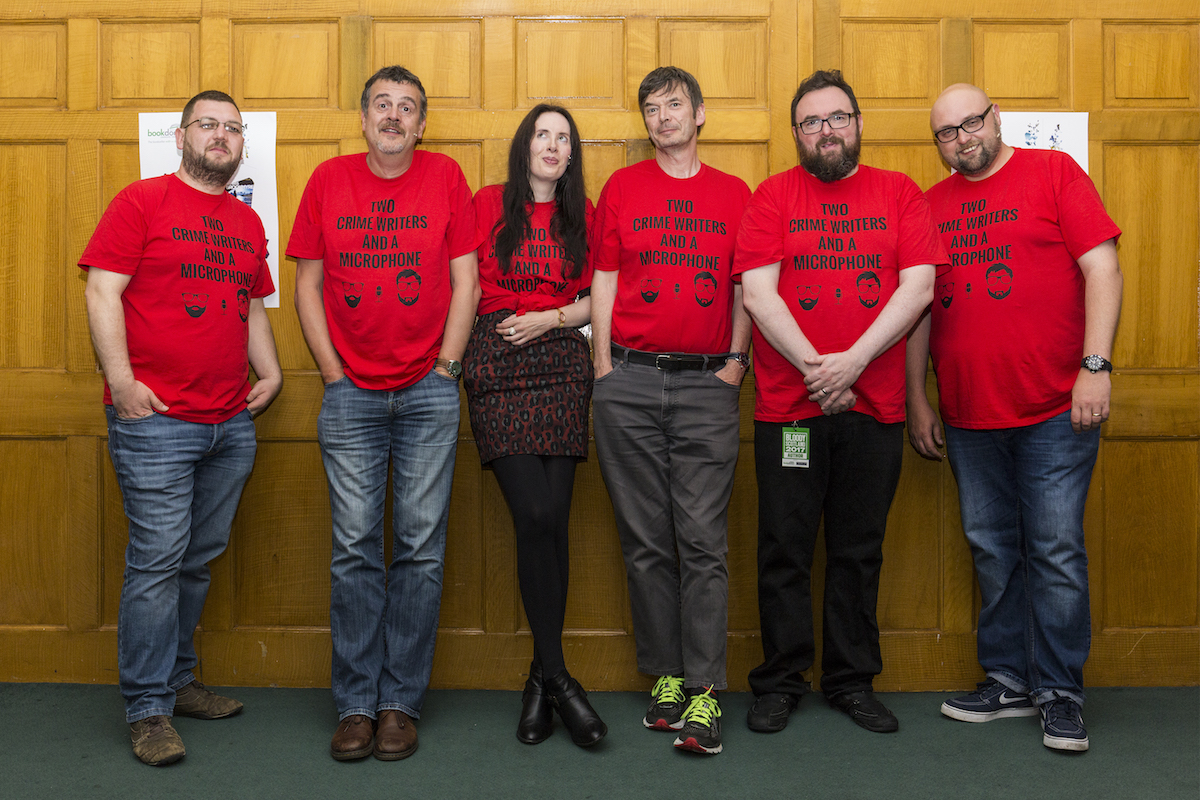
Photo credit: Paul Reich. L to R: Veste, Billingham, Dolan, Rankin, Neville, Cavanagh.
Kudos to Denise Mina for winning Bloody Scotland’s McIlvanney Prize for the best Scottish Crime book of the year. Her terrific The Long Drop is a beautifully-paced, novelistic slice of 1950s Glasgow, as well as an astute re-imagining of a real-life crime that riveted the city (and, to some extent, still does). Cheekier kudos are due to the Two Crime Writers and A Microphone podcasters Steve Cavanagh and Luca Veste, and their festival live-event featuring a cast of crime-fiction gold: Ian Rankin, Eva Dolan, Mark Billingham, and Stuart Neville. Catch the hilarious, expletive-strewn outcome here, with episode 47.
Reading around: new titles on the crime fiction scene
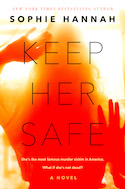
Sophie Hannah excels at slightly paranoid, overly imaginative, furiously curious women who inevitably land themselves in piping-hot water, and, in Keep Her Safe (William Morrow), Cara Burrows is no exception. Off on a furtive, two-week jaunt to a flash Arizona resort, the British Burrows, jet-lagged and on-edge, checks in to her hotel, only to find the room she’s been given is already occupied. Within a matter of hours, Burrows has a bizarre — and top-notch — mystery on her hands: based on what she’s seen in that hotel room, is America’s most famous murder victim actually alive, well and vacationing in Arizona? Hannah’s fully fleshed-out characters and obvious relish for the outrageous tides and sweeps of contemporary media culture fuel this page-turner, while her joy of puzzles quietly contributes its soul.
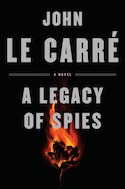
The British Secret Service game is strong in John le Carré’s A Legacy of Spies (Viking). Bookending some of the action of 1963’s The Spy Who Came in From the Cold as well as sharing critical characters with 1974’s Tinker Tailor Soldier Spy, Legacy is narrated by Peter Guillam, close colleague of George Smiley. It appears that some of the Circus’ long-ago spy shenanigans have caught up with them in the present day, and Guillam, summoned to the offices of MI6 from his cozy retirement homestead in Brittany, has some explaining to do. It’s a testament to the ugliness of the current political landscape – which le Carré has fearlessly and vocally addressed in recent novels — that re-visiting the old-school days of a Western intelligence agency provides pure, escapist fun, despite the amoral, duplicitous and exploitative machinations of the agents.
Already in semi-hot water as a witness in a grand-jury proceeding, Darren Mathews, black Texas Ranger, finds himself fully immersed when an FBI pal sends him to check out two homicides in the tiny town of Lark, East Texas. Attica Locke’s terrific Bluebird, Bluebird (Mulholland) simmers with racial tensions, shimmers with unforgiving heat, features a killer soundtrack playing in the background, and offers an early sentence that echoes perpetually throughout the book: “In the wake of Obama, America had told on itself.” But within Bluebird’s deeply atmospheric surround is a story driven by entirely human, individualistic elements — love, fear, entitlement, jealousy — a story told with Locke’s crystal-clear vision and pleasurably elemental prose.
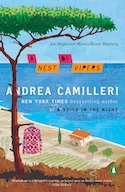
The temptation to stray is, well, tempting in Andrea Camilleri’s A Nest of Vipers (trans. Stephen Sartarelli; Penguin), when Inspector Montalbano is faced with a proper femme fatale while investigating his latest case — the murder of the woman’s father, no less. No sooner has his long-suffering girlfriend, Livia, jetted back home to Genoa, when a dinner invitation-proposal throws him (only temporarily) for a loop. Both fascinated and repulsed by the murder victim who had no qualms about blackmailing and loan sharking an extensive community, Montalbano, true to form, mulls over clues, red herrings and eurekas alike while ingesting the best food Sicily has to offer. Deceptively bordering on cozy, Camilleri’s mysteries never shy away from concealing a dark-black element at their heart.
The Quintessential Interview: JA Jance
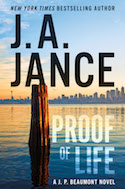
J.A. Jance’s Seattle PI J.P. Beaumont has been on the murder-solving scene since 1985’s Until Proven Guilty, Jance’s first detective novel. Since then, Jance has kept her scores of books band-box-fresh and her prose moving along at a peppy pace. In her latest, Proof of Life, the depth of Beaumont’s career provides rich fodder for the current mystery as now-retired Beaumont finds himself embroiled in the supposedly-accidental death of retired reporter and part-time nemesis Maxwell Cole.
What or who are your top five writing inspirations?
I have no idea! Not only do I not have five — I don’t have one!
Top five places to write?
In my gazebo in the back yard. On the back porch overlooking the garden. In my chair in the family room. On my patio in Tucson. On a cruise ship.
Top five favorite authors?
Jussi Adler-Olsen. Ann B Ross. Lee Child. Daniel Silva. Jo Nesbø.
Top five tunes to write to?
“Crazy” by Patsy Cline. “At Seventeen” by Janis Ian. Mozart’s The Magic Flute. Anything by Anne Murray. Anything by Gentleman Jim Reeves.
Top five hometown spots?
Tea at the Georgian at the Fairmont Olympic. The 5th Avenue Theatre. TechCity Bowl. John Howie Steak. Bridle Trails Red Apple in Kirkland.
Thursday Comics Hangover: A Bonding experience
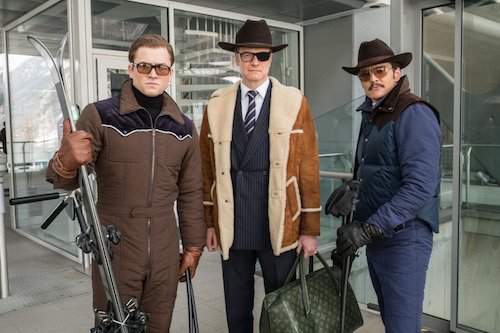
I try not to give Birth Movies Death any web traffic these days due to the noxious way the site's owner protected former BMD editor Devin Faraci in the wake of sexual assault accusations. But it's impossible for me to separate my viewing of Kingsman: The Golden Circle from a 2015 essay on the original Kingsman film by Film Crit Hulk.
I found the first Kingsman movie to be boorish and awkward in its handling of James Bond satire, though I did appreciate the way the film addressed the inherent classism of the Bond mythos. Hulk's essay didn't necessarily convince me to reappraise Kingsman as a brilliant work of art, but he did argue that the filmmaker, Matthew Vaughn, knew exactly what he was doing with the film: that Vaughn was producing, essentially, the world's only honest blockbuster movie — one that embraced the political discomfort of Bond movies.
Kingsman, of course, is adapted from a comic book series written by Mark Millar, an amoral dolt who has lowest-common-denominatored his way to great success. (I wrote about Millar in this space not so long ago.) Vaughn has taken the basics of Millar's premise — what if a poor kid became the next James Bond? — and made all the class issues entirely overt. Young Eggsy (a charismatic Taron Edgerton) is a chav who gets recruited by a Bond-like agent (Colin Firth, clearly having a lot of fun) to join a secret organization of spies who defend England from outsize global villains.
Despite a few missteps, (Samuel L. Jackson offers maybe his worst performance since Frank Miller's Spirit adaptation) even the most skeptical viewers had to admit that Kingsman was entertaining as hell, a skosh of R-rated blockbuster ultraviolence to while away time in the multiplex.
The Golden Circle will likely not invite a high level of investigation from writers like Film Crit Hulk. It is, to put it bluntly, a bad movie. It's boring and it's weighed down with exposition and the attempts at humor don't land successfully. If the first film was a sly investigation of class, the second film can't even convincingly sell itself as an investigation of how awful sequels usually are.
Of course, parts of The Golden Circle work really well: Vaughn's action sequences are buttery-smooth and boundlessly fun to watch. Julianne Moore, as the breathlessly chipper drug-dealing villain, is fantastic. Her character's plans to change the world are more interesting than your standard movie bad-guy dreck. Edgerton and Firth maintain their excellent rapport from the first film.
But most of The Golden Circle is self-serious and overblown. Channing Tatum shows up for about ten minutes of screentime, total. Some of the action sequences feel weirdly weightless. Other scenes fail to keep the plot moving forward. I have a hard time picturing any serious claim that The Golden Circle is another showcase of Vaughn's sly satirical skills. The class elements of the first film have basically disappeared, and the Bond nods feel less playful and more obligatory.
The Golden Circle is one of those rare sequels that actively diminishes the film that came before it. It's a film that's just as dumb as the comic that inspired it.
Your Week in Readings: The best literary events from September 20th - September 26th

Wednesday September 20th: Season of Sacrifice Reading
Seattle writer Bharti Kirchner has written a ton of great novels that you should check out. Tonight, though, she’s debuting something new: the first book in a mystery series starring a Seattle private investigator named Maya Mallick. In Season of Sacrifice, she investigates the self-immolation death of a prominent scientist.Elliott Bay Book Company, 1521 10th Ave, 624-6600, http://elliottbaybook.com . Free. All ages. 7 p.m.
Thursday, September 21st: Grab Back Comics Reading
Grab Back Comics started as a website collecting comics stories about sexual assault and harassment. Now it’s been collected in a beautiful print anthology. Tonight, the anthology’s editor, Erma Blood, appears with local cartoonists Amy Camber, Gillian Rhodes, Robin Elan, Tatiana Gill, and Tess LeBlanc. Third Place Books Seward Park, 5041 Wilson Ave S, 474-2200, http://thirdplacebooks.com. Free. All ages. 7 p.m.
Friday September 22nd: Over the Top
This one is a little different: The Washington National Park’s Discovery Group hosts a booze dinner in which scientific experts discuss projects they’re running in Washington national parks. At the end of the night, one of the projects will be funded by pooling everyone’s admission fee in a kind of American Idol for science. Georgetown Ballroom, 5623 Airport Way S., 762-4999. http://wnpf.org. $25. All ages. 5:30 p.m.Saturday, September 23rd: A Lesser Love Reading
See our Event of the Week column for more details. Hugo House, 1021 Columbia St., 322-7030, http://hugohouse.org. Free. All ages. 7 p.m.Sunday, September 24th: Poetry in Conversation: The Lice
Seattle poet Bill Carty presents a special book-club-type discussion about The Lice, a seminal 20th century American poetry collection by W.S. Merwin. (The book has been republished by Port Townsend publisher Copper Canyon Press this year.) Come and talk about poetry with a poet. If you disagree, feel free to argue. Poetry will survive the scrutiny. Open Books, 2414 N. 45th St., 633-0811, http://openpoetrybooks.com. Free. All ages. 4 p.m.Monday September 25th: Dinner at the Center of the Earth Reading
You might remember Nathan Englander’s debut collection of short fiction, For the Relief of Unbearable Urges, for its beautiful sweaty cover. His new novel looks at a controversial subject — the conflict between Palestine and Israel — through the experiences of a disparate group of people including a prisoner and a waitress. Elliott Bay Book Company, 1521 10th Ave, 624-6600, http://elliottbaybook.com . Free. All ages. 7 p.m.Tuesday September 26th: Bad Kansas Reading
Author Becky Mandelbaum recently moved to the Pacific Northwest, but before she did that, she published her first collection of short fiction. That book won the Flannery O’Connor Award for Short Fiction, which is no fucking joke.Tonight, she’ll be interviewed by great American author Pam Houston. Elliott Bay Book Company, 1521 10th Ave, 624-6600, http://elliottbaybook.com . Free. All ages. 7 p.m.Drawn from felt
Published September 20, 2017, at 11:00am
Comic artist Kelly Froh looks at her experience reading a biography of a wonderful human being.
Literary Event of the Week: A Lesser Love Launch Party
EJ Koh read her poem “South Korean Ferry Accident” to a room full of weary Bumbershoot attendees back in 2016. It’s a poem that begins with a bit of comedy: “Footage is released to the public: the captain/abandoning the ferry in his underwear.” Not only do we have an oafish captain forsaking the universal pledge to go down with the ship, but he’s jumping overboard in his underwear. It’s an image that brings pratfalls to mind, or a Benny Hill-style soundtrack.
But that image falls away to the real-life horror of one of the worst boating accidents in modern history. And Koh’s personal story becomes intertwined with the tragedy:
My parents are crying in the other room. “Why didn’t
the students jump into the water?
Americans would’ve jumped.”
It’s an immigrants’ dilemma: there’s something to be said for the traditions of one’s birth country, but when they become too constricting — when tradition overrules your chances of survival — it becomes necessary to flee to America. In America, traditions don’t kill you. If anything, too much freedom will kill you in America.
Last year, when Koh read the poem (“The footage is broadcast. The faces are blurred./The voices are changed. They are laughing”) the audience reacted almost as one. Eyes started watering. A few nasal snfffs tore through the audience, and then shoulders bobbed up and down. People were sobbing for these strangers that they’d never know who died in a ferry disaster, and who were being summoned by a Seattle poet for a Seattle audience at a quintessentially Seattle event. It was a tender moment, a special moment, the kind of event that everyone in attendance will likely always remember.
This is the genius of EJ Koh: her poetry combines tradition and freedom and history and hope and biography and tragedy in such a compelling way that audiences can’t help but be moved. Her voice is clear and warm; her eyes catch the little human moments that we often take for granted. Her poems are often slight — brief and simple — but they can clamber around your head like an elephant.
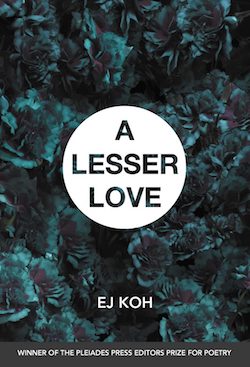
This Saturday, September 23rd, Koh will launch her debut collection, A Lesser Love, into the world at the Hugo House. She’ll read from the book, and then I’ll interview her onstage (I guess this is as good a place as any for a full disclosure: the Seattle Review of Books, has advocated early and often for Koh beginning on the day that we first published her jaw-droppingly good poem “Korean War” two years ago) and then she’ll take your questions.
In person, audiences are often surprised to see that Koh doesn’t seem as intense as her poems. She’s funny; she laughs a lot; she’s charming and humble. But the intensity is there, and it is real. With just a few words, carefully selected and arranged just so, she can bring a room full of humans to tears. She has that power
Matthew Gault at Motherboard writes:
Pepe the Frog creator Matt Furie has made good on his threat to "aggressively enforce his intellectual property."
The artist's lawyers have taken legal action against the alt-right. They have served cease and desist orders to several alt-right personalities and websites including Richard Spencer, Mike Cernovich, and the r/the_Donald subreddit. In addition, they have issued Digital Millennium Copyright Act takedown requests to Reddit and Amazon, notifying them that use of Pepe by the alt-right on their platforms is copyright infringement. The message is to the alt-right is clear—stop using Pepe the Frog or prepare for legal consequences.
Of course, the alt-right is fighting back, citing free speech. Nazis love to use the free speech defense. We'll see how that works out for them. Hopefully, it will look something like this.
Heyyyyyyy! An actually useful piece of information has been added to Google searches: now when you look up books, Google will include links to ebook listings at local libraries. Just look all the way at the bottom of the card that comes up when you Google a book title and you'll find it there. I can't remember the last time Google made a change that actively improved my life with no serious setbacks, so this is a welcome development.
Driving Home From Mother's House
As I drive through the bower
of old oak trees
scanning 68th and 20th avenues northeast
I am scared by the moon.
It is so low in the sky this night
I think it will smack me in the face.
I try to turn the wipers on,
but strands of hair white as paste
cover the window like thick rain.
A woman's mouth stretches open
in a silent scream. Bent fingers claw
until they reach my chest.
Some nights I lose my way home.
The line between "you" and "me"
Published September 19, 2017, at 12:39am
The latest book from Mount Analogue is a book, an art installation, and a friendship.
Modern life — guided by a set of tested principles
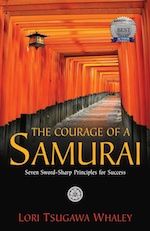
Sponsor Lori Tsugawa Whaley, a third-generation Japanese American, was raised in a primarily Caucasian community and felt disconnected from her Japanese heritage. While exploring this ancient culture, she discovered a source of truth — the code of ethics known as bushido. Bushido means “the way of the warrior”; it is the set of chivalrous principles that governed the behavior of the ancient Japanese warriors known as samurai.
In The Courage of a Samurai, Lori Tsugawa Whaley brings these concepts to everyday life, showing through examples the kind of ethical and moral choices you can make when guided by principles. As she says, "I believe you were born to live a life of courage, honor, and integrity." Read an excerpt on our sponsor's page.
Sponsors like Lori make the Seattle Review of Books possible. Did you know you could sponsor us as well? Get your stories, or novel, or event in front of our passionate audience. Take a glance at our sponsorship information page for dates and details.
Explaining the inexplicable
Published September 18, 2017, at 11:57am
If Hillary Clinton's new book about the 2016 election makes you mad, then you are exactly the kind of person who should read Hillary Clinton's new book about the 2016 election.

